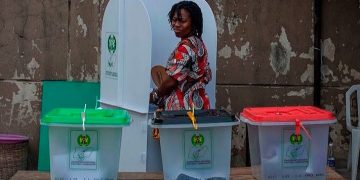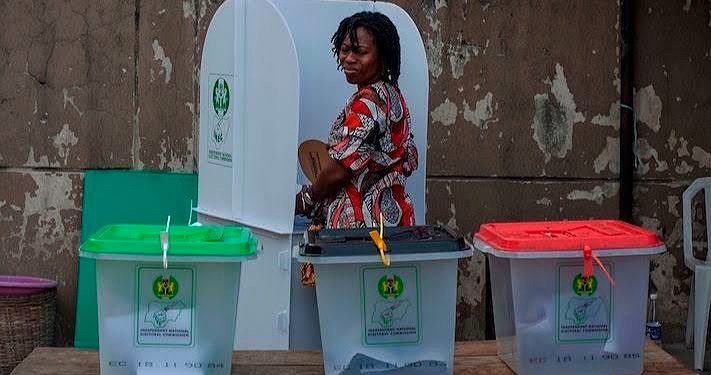By John Ikani
As the clock struck midnight on January 1st, 2023, Africa ushered in the New Year with a bang – or should we say a ballot?
This is as no fewer than 20 countries across the continent are gearing up for government shake-ups in the form of elections.
From Nigeria to Gabon, Liberia to Sierra Leone, and Zimbabwe to DR Congo, it’s the year of presidential hopefuls, with their campaign promises and (hopefully) fair and free voting.
Some other countries will be holding regional, district and local elections. They include; the Central African Republic, Comoros, Côte d’Ivoire, Djibouti, Egypt, Ghana, Guinea, Guinea-Bissau, Mali, Togo and Swaziland.
So, whether you’re a political junkie or just a curious observer, it looks like 2023 is shaping up to be a year of change and democracy in Africa.
What may likely play out in countries holding presidential elections?
1. Nigeria:
The stage is set and the stakes are high for Nigeria’s upcoming February 25th election.
Citizens of Africa’s most populous country are ready to ensure that a befitting leader succeeds President Muhammadu Buhari whose tenure expires on May 29.
It’s a three-way race to the finish line with Atiku Abubakar, Bola Ahmed Tinubu, and Peter Obi all gunning for the top spot.
With the economy on a downward spiral and insecurity on the rise, which presidential hopeful has the energy and determination to turn things around?
If the election were decided by social media alone, Obi would be a surefire winner. But as we all know, in African politics, money talks, tribal alliances sway, and religious beliefs play a major role.
So, hold onto your hats folks, because this election is bound to have its fair share of surprises and possibly, a few outcries.
2. Sierra Leone
In Sierra Leone, Julius Maada Wonie Bio, the ex-military dictator turned President of the nation, is gunning for another term in office.
The 58-year-old is hoping to win back the trust of his fellow citizens in the upcoming election slated for June.
While Sierra Leone is rich in natural resources such as diamonds, coltan, tantalite, gold and chromite, her citizens live in poverty and the nation’s infrastructure is in shambles.
Should Bio win the election, he will need to make sure he keeps his promises and delivers on development, or risk losing the support of his people.
3. Liberia
Liberians are gearing up for a nail-biting election this year, as they decide whether to give ex-football star, George Oppong Weah, another term in office or to take a gamble on one of his opponents.
Weah’s coalition government went kaput as the elections drew near, just like the trust of his citizens in him.
Last year, he was criticized for taking a much-needed “time-out” for a global tour, earning him the nickname “the absentee president.”
Two prominent politicians, Joseph Boakai, 76-year-old former vice president of the Unity Party, and businessman Alex Cummings of the Alternative National Congress (ANC) are throwing their hats in the ring to challenge Weah’s presidency.
With the election set for October, Weah has a short time to prove he still got the magic touch to bring change to Liberia.
4. Democratic Republic of Congo (DRC)
For the good people of the Democratic Republic of Congo (DRC), the general elections coming up in December 2023 promises to be a wild ride. President Felix Tshisekedi will be defending his throne and trying to prove to voters that he’s still the man for the job.
Back in 2019, Tshisekedi promised to bring security to the country, and even reached out to neighbouring countries like Rwanda, Burundi, and Uganda to improve relations. But things have taken a turn for the worse, as relations with Rwanda have soured and violence in eastern provinces has escalated.
However, the failure is not stopping Tshisekedi from going for the win. He’s up against some tough opponents like former governor and businessman – Moise Katumbi; one-time premier and senator, Augustin Matata Ponyo as well as former lawmaker, Martin Fayulu.
It is going to be an interesting race, with lots of twists and turns. You won’t want to miss this one if you’re a fan of political drama!
5. Zimbabwe
Zimbabwe is gearing up to hold its general elections in the second half of 2023. President Emmerson Mnangagwa, who took over after Robert Mugabe’s ousting in 2017, will be facing some fierce competition from Nelson Chamisa and his Citizens Coalition for Change team.
But Mnangagwa, being a good political student of Mugabe, has made some changes to laws which may restrict the opposition’s space.
The big question on everyone’s mind is whether Zimbabwe can finally stage an election that is universally accepted as credible.
While a credible election won’t solve all of the country’s problems, it’s a necessary step for Western states and international donors such as the IMF to re-engage with Zimbabwe and help bring about some much-needed political, economic, and social reforms.
It’s going to be an exciting year for Zimbabwe, let’s see what happens!
6. Gabon
In Gabon, the race for the nation’s presidency is heating up, but there’s only one runner in the race – 63-year-old Ali Ben Bongo Ondimba, the sole candidate of the Gabonese Democratic Party, known by its French acronym PDG.
He may be relatively young compared to other African presidents, but he’s not exactly in tip-top shape, having suffered a stroke and is largely infirm.
But don’t feel too bad for him, he’s got something most presidential candidates can only dream of – a guaranteed win.
With no credible opposition to the Bongo Dynasty that has ruled the country since 1967, the only question left is when the date and month for the 2023 presidential election will be announced.
What happened to Sudan, South Sudan and Libya?
While other countries in Africa are gearing up for elections this year, the polls may be delayed for Sudan, South Sudan, and Libya. The reason? A trifecta of trouble.
They include disputes over the structure of the elections, a lack of funds, and security situations that are less than ideal.
But don’t worry, they’ll figure it out eventually because where there’s a will, there’s a way to hold an election, even if it’s delayed.
Will the 2023 elections strengthen Democracy?
Democracy is pathetically flawed in Africa and can be likened to trying to cook jollof rice with only half the ingredients, it just doesn’t come out right. As critical as that may sound, it is the truth.
In countries like Zimbabwe, South Sudan, and Cameroon, democracy is more of a reflection of the elite’s interests rather than the people’s.
And in Nigeria, it’s like watching a poorly rehearsed play put on by corrupt officials who are more interested in keeping their wallets full than fixing a broken economy.
When it comes to African politics, it’s not uncommon for leaders to overstay their welcome. Constitutions may say that top positions like President and Prime Minister can only serve for 4 or 5 years, but some politicians have found ways to hold onto power for decades, using constitutional coups to keep them in the driver’s seat.
Take Cameroon, where President Paul Biya has been in power since 1982, or Equatorial Guinea, where Teodoro Obiang Nguema has been calling the shots since 1979, making him the longest-serving head of state in the world.
And let’s not forget other leaders like Denis Sassou Nguesso of the Republic of Congo, Yoweri Museveni of Uganda, and Isaias Afwerki in Eritrea, who have all been in power for over 30 years. It’s like they’re trying to break the world record for the longest political tenure.
As 2023 approaches and Africans gear up to head to the polls, there’s no telling what the future holds. But as the old saying goes, “even a bad democracy is better than the best dictatorship.”
So, as people head to the polls this year, let’s hope for the best and work towards a brighter future for the continent.




































